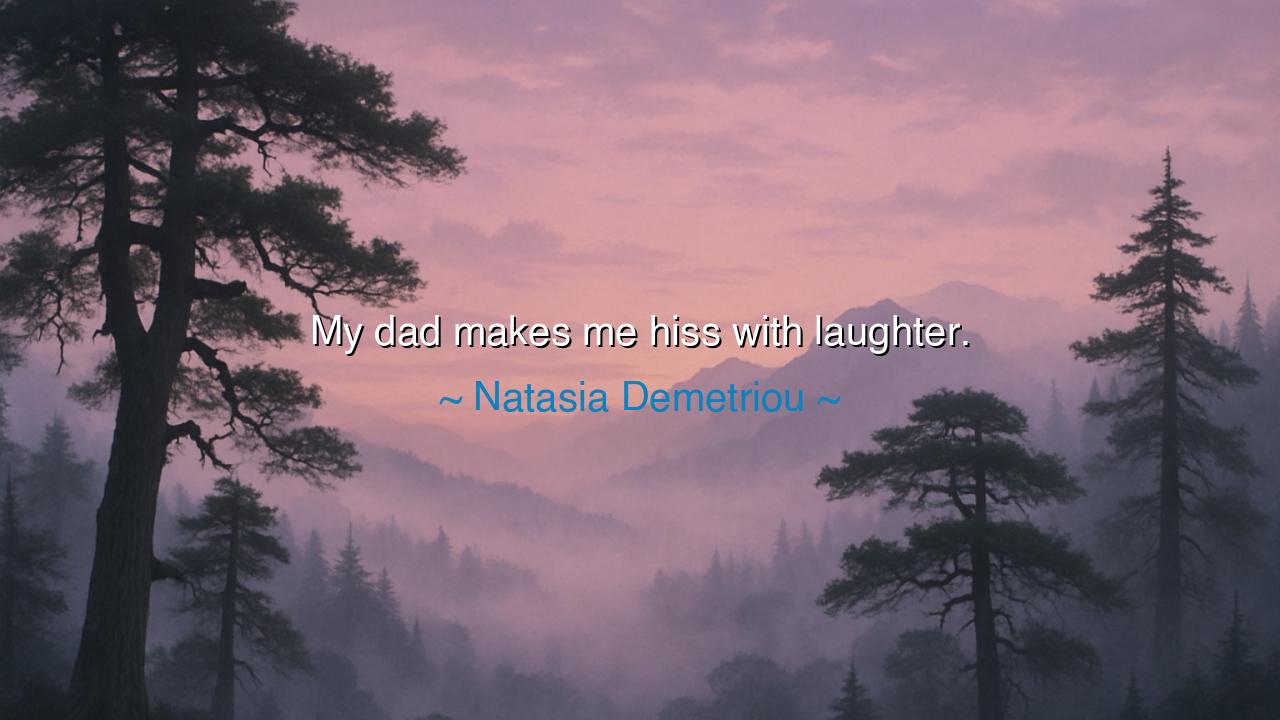
My dad makes me hiss with laughter.






“My dad makes me hiss with laughter.” — Natasia Demetriou
In these simple yet radiant words, Natasia Demetriou, a comedian of wit and warmth, gives voice to one of life’s most sacred treasures — the bond between parent and child, and the healing power of laughter that flows between them. Her words are not grand nor gilded, yet they shimmer with truth: that joy, shared with those who raised us, is one of the purest forms of love. To “hiss with laughter” is to laugh so deeply that it breaks past dignity, past composure, until what remains is the raw, unguarded delight of the soul — the sound of childhood remembered, the echo of affection that has never died.
The meaning of her words reaches beyond humor. For laughter, in its truest form, is the great leveler — it dissolves pride, fear, and sorrow. When Demetriou speaks of her father making her laugh, she speaks of a man who gave her not just jokes, but joy; not just amusement, but the freedom to be vulnerable, silly, and alive. In that shared laughter, father and daughter stand as equals, two hearts meeting in the most human of ways. Laughter, then, becomes not mere reaction but connection — a living bridge between generations, between souls.
From the time of the ancients, the wise have known the sanctity of joy. The philosopher Aristotle wrote that laughter is a sign of rationality — that only beings capable of reflection can find humor in life’s absurdities. But even beyond reason, laughter was seen as divine. The Greek gods themselves, after battle and banquet, were said to laugh upon Olympus, their joy shaking the heavens. Thus, in Natasia’s words, there lies something timeless: the recognition that to laugh with those you love is to touch the divine — to share, if only for a moment, in the music of creation itself.
Consider the story of Abraham Lincoln, burdened with the weight of war and the sorrow of a divided nation. His heart, heavy with loss, might have been broken if not for his sense of humor. He would often gather his advisors and tell tales that brought smiles even in the shadow of despair. Once, when criticized for laughing amidst tragedy, he replied, “If I did not laugh, I should die.” In this, we see that laughter is not weakness, but strength; not denial, but endurance. It is how the weary soul breathes again. Demetriou’s laughter, shared with her father, springs from that same fountain — laughter as refuge, laughter as love, laughter as life’s defiance against sorrow.
But there is something particularly powerful in the laughter of family. Parents are our first storytellers, our first teachers in the art of finding joy. To make one’s child laugh is to teach them not to fear life’s weight, to show them that even amid chaos, there is room for delight. In remembering her father’s humor, Demetriou honors a truth that the ancients knew well: that joy is inheritance, passed not through blood alone, but through the shared rhythm of laughter at the dinner table, through stories told again and again until they become part of the family’s soul.
And yet, there is humility in her tone. The laughter she describes is not polished or graceful — it is a hiss, wild and unrestrained, stripped of self-consciousness. It reminds us that true joy is never refined. It is messy, loud, alive. In our age of masks and images, to laugh until one hisses is to return to innocence, to the honesty of childhood. It is to remember that love, in its purest form, is unselfconscious. When we laugh with those we love, we are reborn for a moment into authentic being — ourselves without defense.
So, O listener, let this be your teaching: seek those who make you laugh, and cherish them. Laughter is the breath of the soul, the proof that light still lives within you. When the world feels heavy, remember that to share joy with another — especially one who has shaped your life — is to affirm your own humanity. Call your father, your mother, your friend; tell them a story, hear their laughter, and let the sound heal the cracks time has made. For one day, all things will fade, but the memory of laughter shared in love will remain, echoing beyond years — a whisper of eternity, a hiss of joy.






AAdministratorAdministrator
Welcome, honored guests. Please leave a comment, we will respond soon